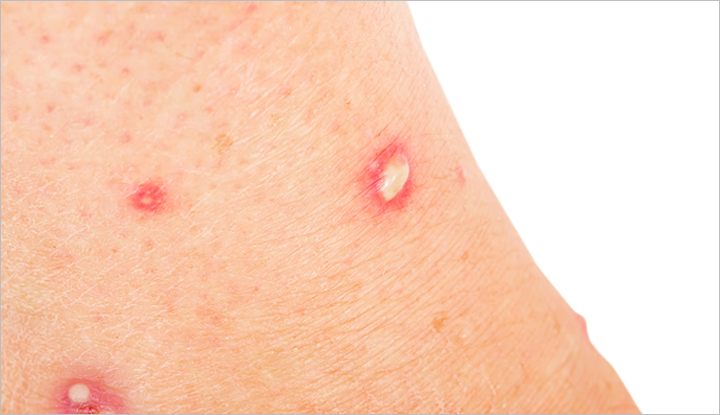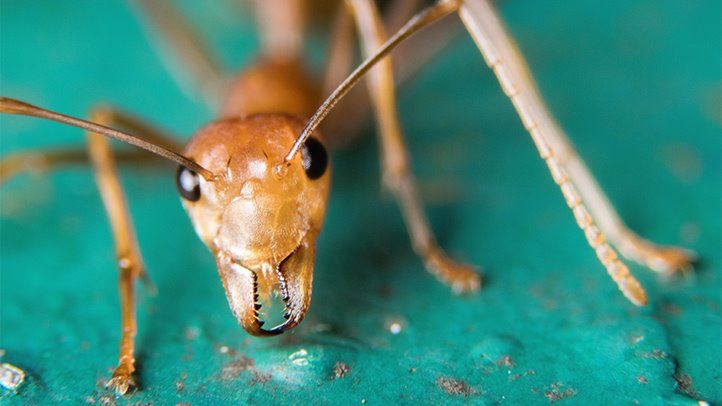If an ant bites you, wash the affected area with soap and water immediately. Apply a cold compress to reduce swelling.
When an ant bites you, it can cause discomfort and irritation. Knowing the proper steps to take can help alleviate symptoms and promote faster healing. Most ant bites result in localized swelling that subsides within a few days, but in some cases, they may lead to allergic reactions or prolonged discomfort.
Understanding how to treat ant bites at home can provide quick relief and prevent further complications. By following simple remedies and guidelines, you can effectively manage ant bites and promote healing. We will explore the best ways to address ant bites to ensure a speedy recovery and minimize any potential complications.

Credit: www.imperialpestprevent.com
Recognizing Ant Bites
If an ant bites you, immediately wash the affected area with soap and water. Then, apply a cold compress or aloe vera gel to reduce swelling. If symptoms persist, use over-the-counter antihistamines or topical creams. In severe cases, seek medical attention for allergic reactions or significant local reactions.
Identifying The Symptoms
Ant bites can cause discomfort and irritation, and it’s important to recognize the symptoms to know how to properly address them. When dealing with ant bites, it’s crucial to pay attention to any changes in your body and take appropriate action. Here are the common symptoms to look out for:- Localized pain and redness at the bite site
- Swelling and inflammation around the bite area
- Itching and a feeling of irritation
- A raised bump or pustule
- A burning or stinging sensation
Distinguishing Between Types Of Ant Bites
Different types of ants may have different effects on the human body when they bite. It’s important to distinguish between these types of ant bites to determine the best course of action. Here are some common types of ant bites and how to identify them:| Type of Ant | Description |
|---|---|
| Fire Ants | Fire ant bites typically appear as clusters of small, red bumps or pustules. They are known for their intense burning sensation and can cause severe allergic reactions in some individuals. |
| Carpenter Ants | Carpenter ant bites may cause a mild reaction characterized by localized pain, swelling, and redness. These bites are usually not as painful as fire ant bites, but they can still cause discomfort. |
| Bullet Ants | Bullet ant bites are known to be extremely painful. They can cause intense swelling, redness, and even lead to systemic symptoms such as fever, dizziness, and muscle aches. These bites should be treated with caution. |
:max_bytes(150000):strip_icc()/FireAntBite-9f9561b55155424b997d2bbb6cbccc7a.jpg)
Credit: www.health.com
Immediate Actions To Take
When an ant bites you, it’s important to take immediate actions to alleviate the discomfort and prevent any potential allergic reactions. Here are the steps you should follow:
First Aid For Ant Bites
- Clean the affected area with soap and water.
- Apply a cold compress to reduce swelling and pain.
- Avoid scratching the bite to prevent infection.
- If available, apply an over-the-counter antihistamine cream to reduce itching.
Identifying Allergic Reactions
- Monitor the bite site for any unusual swelling, redness, or spreading of discomfort.
- Watch out for symptoms such as difficulty breathing, hives, or dizziness.
- If you experience severe reactions, seek immediate medical attention.
Remember, quick and appropriate actions can help mitigate the effects of ant bites and ensure a speedy recovery. Stay vigilant and take care of your skin!
Home Remedies For Ant Bites
If an ant bites you, there are several home remedies you can try. Applying a cold compress or ice, fresh aloe vera gel, a baking soda paste, or vinegar can help reduce swelling and soothe the affected area.
Using Cold Compress Or Ice
Applying a cold compress or ice wrapped in a cloth can help reduce swelling and relieve the discomfort caused by ant bites.
Applying Natural Remedies
Explore the power of natural remedies to soothe ant bites. Try fresh aloe vera gel, a paste of baking soda and water, or dabbing vinegar-soaked cotton onto the affected area.
Medical Treatments
Ant bites can cause discomfort and itching, and in some cases, they may lead to allergic reactions. While mild ant bites can often be managed at home with simple remedies, there are medical treatments available for more severe cases. If your symptoms don’t respond to over-the-counter medications, your doctor may advise prescription-strength treatments.
Over-the-counter Medications
Over-the-counter medications can help alleviate the symptoms of ant bites. These medications are easily accessible and can be useful in reducing itching, pain, and swelling. Here are some common types of over-the-counter medications that can be effective:
- Topical creams or gels: Products containing hydrocortisone can help relieve itching and reduce inflammation.
- Antihistamines: Taking oral antihistamines can provide relief from itching and help reduce allergic reactions.
- Pain relievers: Over-the-counter pain relievers such as acetaminophen can be used to alleviate pain and discomfort caused by ant bites.
Prescription-strength Treatments
In more severe cases or when over-the-counter medications do not provide sufficient relief, your doctor may recommend prescription-strength treatments for ant bites. These treatments are stronger and may be more effective in managing symptoms. Some examples of prescription-strength treatments include:
- Corticosteroids: Your doctor may prescribe corticosteroids to help reduce inflammation and swelling caused by ant bites.
- Epinephrine injection: In cases of severe allergic reactions, your doctor may administer an epinephrine injection to quickly counteract the symptoms.
It’s important to consult with a medical professional before using any prescription-strength treatments. They can provide a proper diagnosis and recommend the most appropriate course of action based on your specific situation.
Preventive Measures
If an ant bites you, immediately wash the affected area with soap and water. Apply a cold compress to reduce swelling and itching. Consider using a paste of baking soda and water or aloe vera gel to alleviate discomfort.
Sure. Here are some guidelines to follow preventing ant bites, and what to do if an ant bites you:Preventive Measures Ants are tiny creatures that can cause discomfort with their bites. However, following some preventive measures can significantly reduce the risk of getting bitten by ants.H3 headings: Avoiding Ant Habitats One of the most effective ways to prevent ant bites is to avoid their habitats. Keep your living areas, especially the kitchen and dining areas, clean and free of crumbs or food particles that can attract ants. Seal any cracks or holes in doors, windows, or walls to prevent ants from entering your home.H3 headings: Protective Clothing and Pest Control Wearing protective clothing such as long sleeves, pants, and closed-toe shoes can help prevent ant bites, especially when spending time outdoors. Additionally, consider using pest control methods such as spraying insect repellent around the perimeter of your home and garden to keep ants at bay.In summary, to prevent ant bites, it’s crucial to avoid ant habitats and use protective clothing and pest control methods to keep ants away. By following these measures, you can reduce the likelihood of experiencing the discomfort associated with ant bites.
Credit: my.clevelandclinic.org
Frequently Asked Questions On What To Do If Ant Bites You
How Long Does An Ant Bite Last?
An ant bite typically lasts a few days, with localized swelling that may need prescription medication if severe.
What Is The Best Home Remedy For Ant Bites?
For ant bites, you can try these home remedies: 1. Apply a cold compress or ice wrapped in a cloth to the affected area. 2. Apply fresh aloe vera gel directly to the bite. 3. Mix a small amount of baking soda with water to create a paste.
4. Dab a cotton ball soaked in vinegar (such as apple cider vinegar or white vinegar) onto the ant bite.
Is It Okay If An Ant Bites You?
It’s not okay if an ant bites you, as it can cause mild to unpleasant symptoms. Ant stings from harvester ants and fire ants can lead to allergic reactions. Use home remedies like ice, aloe vera, and baking soda paste, and seek medical attention for severe symptoms.
When Should You Go To The Er For An Ant Bite?
If you experience shortness of breath, hives, or swelling of the face and throat, seek emergency care for ant bites.
Conclusion
If you find yourself bitten by ants, it’s essential to take immediate action to alleviate the symptoms. Applying a cold compress or ice wrapped in a cloth can help reduce swelling. You can also use a mixture of baking soda and water as a soothing paste.
Applying fresh aloe vera gel or vinegar-soaked cotton balls onto the bite can offer relief. If symptoms persist or worsen, it’s important to seek medical attention. Remember, prevention is key, so take necessary precautions to avoid ant bites in the first place.
Stay safe and protect yourself from ant bites!

I’m MD Tanvir, and I bring years of expertise gained from working closely with pest control companies to the forefront. My journey in the industry has inspired me to launch Bug Battler, a platform aimed at equipping people with the know-how to combat pests autonomously. Through Bug Battler, I aim to empower individuals with practical insights to tackle pest infestations effectively.

